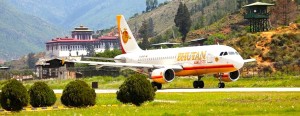MORE DOMESTIC ROUTES TO BE COVERED BY BOTH THE AIRLINES IN BHUTAN
The government has informed Tashi Air subsidiary Bhutan Airlines to recommence domestic flights by April, next year.
The decision comes seven months after it decided that the private airline must recommence domestic operations. However, Tashi Air had re-appealed for a two-year deferment causing the decision to be discussed and alternatives explored until now.
It’s first appeal was made in October last year, when it was supposed to have initially resumed domestic operations.
Tashi Air, while committing to meeting its domestic obligations, had appealed on grounds that its international services were still in the red and that it would be operating two loss-making services simultaneously, risking its entire operations shutting down.
The government’s latest decision provides Tashi Air with five months to introduce domestic operations. In total, a year and six months has passed since Tashi Air’s first appeal.
The government has also instructed national airline Drukair to begin scheduled services to Gelephu domestic airport by December 17, this year.
In April, the government had also issued an ultimatum to Drukair to either operate to all domestic airports or bow out of the domestic market. Drukair currently operates only to Bumthang despite the Gelephu domestic airport being opened a few months back.
Drukair had also responded through the media then that it would continue to operate domestically and that Tashi Air should as well, on grounds that competition in the domestic sector would be as beneficial as it has been in the international sector.
The announcement came in spite of all parties concerned, Drukair, Tashi Air, and even the government, in agreement that the domestic sector was not large enough for two airlines.
The government with the Office of the Attorney General’s assistance explored an alternative solution of having only one airline operate domestically. However, a legal solution was not found bringing the issue back to square one, of having two airlines competing in a market not big enough even for one airline, according to some in the aviation industry.
Lyonpo DN Dhungyel explained that while the government explored the possibility of allowing only one airline it was ultimately decided that the initial agreement had to be adhered to. However, he said that the market is expanding. “The traffic is growing,” Lyonpo said. “Now as we see it, the traffic will definitely grow,” he added. “For two airlines, it will be quite competitive of course, we know that, but because we have to go as per the agreement, as per the RFP (request for proposals) floated in the beginning, we couldn’t really get a way in between.”
The Gelephu market remains unknown. Asked if the government has determined if there is demand for flights to Gelephu, Lyonpo DN Dhungyel said demand should not be a prerequisite for the introduction of air services. He pointed out that initially some scheduled flights may operate empty but that once people come to know of the Gelephu service, following advertising and announcements, demand will be generated.
But the minister also said that it is up to Drukair and the Bhutan Civil Aviation Authority to determine the schedule and frequency of flights to Gelephu. He said even one flight a week, as an intermediate stop on the Paro-Bumthang flight would be satisfactory. “We just want to give a schedule to the people, to the commuters, so that there could be passengers travelling,” he added.
The decision to operate to Gelephu has been left to Drukair which means the possibility of the airline choosing not to operate to the domestic airport does exist.
“We’re optimistic that Drukair will abide by our request and they’ll be starting by December 17,” Lyonpo DN Dhungyel said.
On what would happen if Drukair chose not to fly to Gelephu, the minister said he did not want to preempt any government decision. The minister replied similarly when asked what the government would do if Tashi Air appeals for another deferment.
The CEOs of both airlines did not comment as internal meetings to discuss the issue were yet to be held.
Meanwhile, the Bhutan Civil Aviation Authority director, Wangdi Gyaltshen, said that Gelephu airport has met all critical safety requirements in terms of infrastructure and is certified for scheduled flight operations. On what measures are in place given the airport’s proximity to the border and being located in a sensitive security area, the director said that an arrangement exists with the army to provide security. He pointed out that there are no security issues.
Tashi Air won the domestic air services contract in 2010. It was required to introduce domestic flights followed by international services that would subsidize its domestic operations. However, the government also chose to allow Drukair into the domestic market simultaneously after it was found that its articles of incorporation already permitted it to operate domestically.
In June 2012, Tashi Air was allowed to suspend its domestic operations only six months after introducing it following heavy losses. The agreement was for Tashi Air to resume domestic services one year after it introduced international services.
Source: Kuensel (Gyalsten K Dorji)

